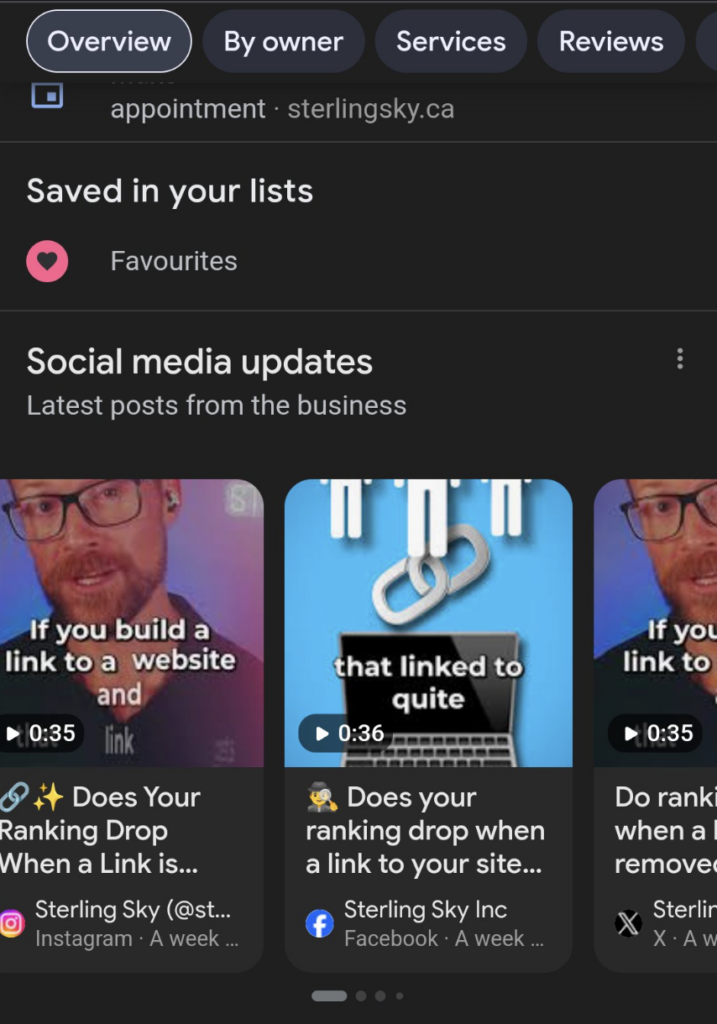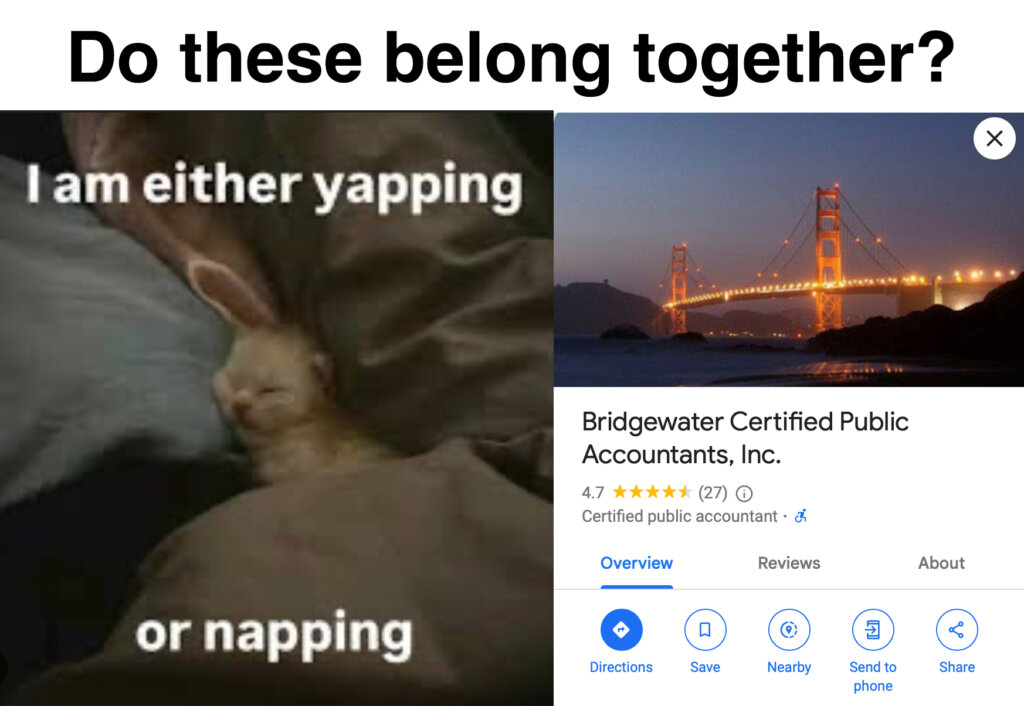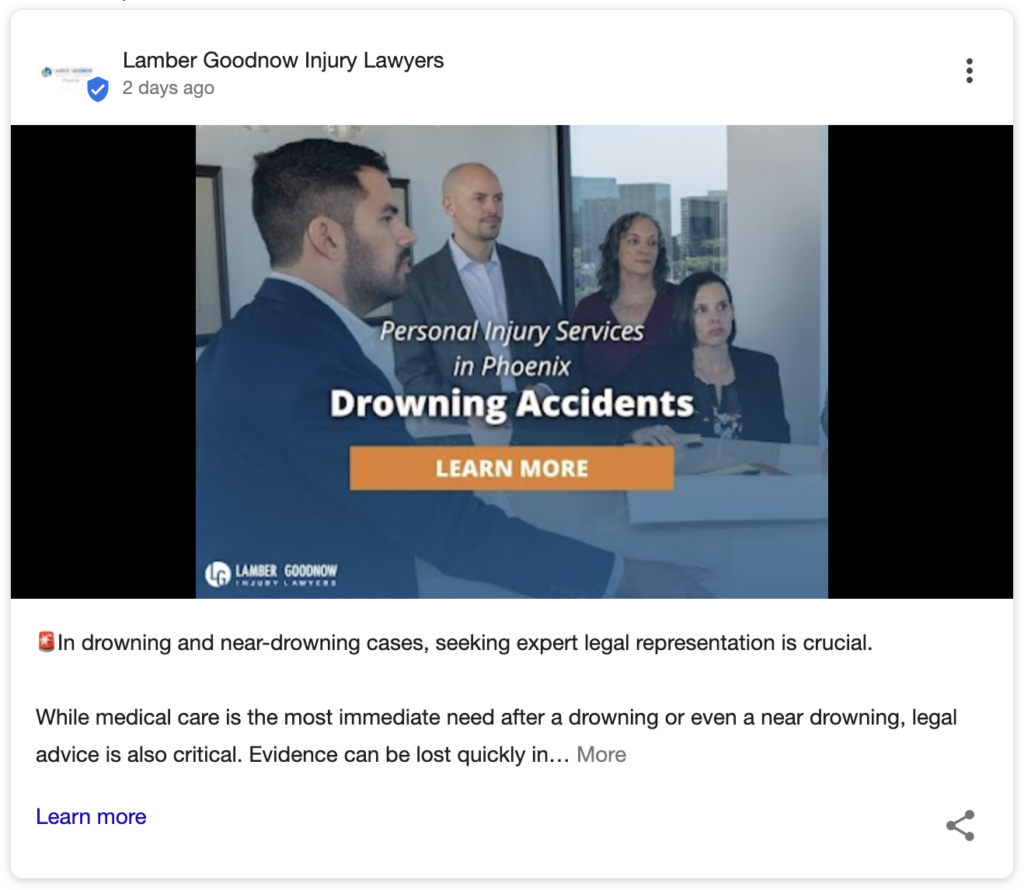🤓 The 2026 Local Search Ranking Factors are here!! Check out the report!
🤓 The 2026 Local Search Ranking Factors are here!! Check out the report!



It’s one of the most awkward experiences in life, not knowing how to act in a situation that’s totally new to you. First job interview, first public speaking engagement? First time being a bridesmaid, or holding a newborn, or meeting your future in-laws? You’re eager to get everything right, but in novel situations, you simply don’t know what’s expected of you yet.
This is how I’m feeling about Google’s foray into surfacing social media directly on Google Business Profiles (GBPs) – a bit uncertain. While local businesses have long been able to add social links to their GBPs, it was only this past March that Google updated its Manage Social Media Links documentation to include the following language:

While lots of GBPs still look like this:
Others are now decked out with social media posts from a mix of sources, like this example from Joy Hawkins:

While this development seems generally popular in the local search industry, I can’t be the only one hitting pause here and needing to ask questions about whether social media posts are actually a good fit for Google Business Profiles. Do they serve the needs of both local businesses and local searchers? What about the sharing vs. selling dynamic of social media? What about the fate of Google Updates?
Let’s tackle some Q&A here to see if we can get out of our awkward phase and onto firmer ground.
Google’s Search Quality Evaluator Guidelines are meant to inform the company’s thousands of quality raters in their work of judging whether algorithms are delivering relevant results. The guidelines devote pages to the concept of “searcher intent” (i.e. what the main goal of a searcher is when they perform a search in Google) and the SEO community typically categorizes this concept into four buckets:
I’ve always thought that you can make a decent argument for local queries falling into all four intent buckets, but Google’s behavior hints that they view local searches as being largely transactional. When search language like pizza near me, furniture store chicago, or emergency dentist is entered into Google’s system, they quickly return local pack results and GBPs on the assumption that the searcher is ready to make a transaction.
From this we know that, at least as far as Google is concerned, people looking at your Google Business Profiles are on the verge of doing business with you. Given that a potential customer has reached this stage in their journey, is it the right time for them to see social media posts of your staff having an office party or participating in a marathon? Let’s ask our own Darren Shaw!
As Darren explains,
“In general, the audience on social media doesn’t want to be sold to, but this is where Google Posts (Updates) are completely different. Your audience for Google Posts is in a transactional state of mind… so your Google Posts should not be about entertaining the reader.”
In other words, while internet users around the world will spend an average of 143 minutes per day looking at funny cat photos on social media, this is not what they’re looking for when they are about to choose a restaurant for dinner that night or a place to buy an EV. You don’t want anything to distract a potential customer when they are just at the point of choosing your local business for a transaction.
Because of this, Darren advocates that the best uses of Google Updates are to:
Pay special attention to this distinction he makes: people finding you for the first time via a local intent search are not your social media followers. And this is what brings up our core question.

Let’s say you’re a Certified Public Accountant who has built up an amused following on social media by journaling the life of your cat. Almost anything goes on platforms like Instagram, TikTok, Facebook, or Twitter (X). But what impression will it make if a legal firm is considering contracting with a new local CPA, and the embedded social media posts on your GBP describe you as “either yapping or napping”?
This is the kind of content neither Darren nor I would suggest putting in your Google Updates, but now that social media is being fed directly to your listings, awkward scenarios like the fictitious one I’ve mocked up above may well begin arising for local brands.
Does this mean you need to stop being silly on social media going forward? Does it mean all your future social posts should be confined to the sell/convince dynamic?
Well, no. That’s not an easy fit, because of this:
This screenshot from Reddit documents one of what must be millions of conversations being had amongst brands and entrepreneurs about the fact that the very places they’d most like to promote themselves on social media are marketing-averse. Groups and communities will simply ban you if you start selling, and many won’t even accept you as a member if your profile name looks like a business name.
It’s this dynamic that has caused local businesses to invest in building a social following around sharing vs. selling, creating engagement and goodwill as part of a longer view of the customer journey. Maybe your social followers will become your customers at some point (if they happen to be located near you) and maybe they won’t. At the very least, your brand looks alive, active, and responsive from building a friendly social media presence.
And it might seem that the solution is to keep being entertaining and engaged on social while confining your Google Updates to the sell/convince strategy. But here’s the problem: I have yet to see a GBP on which a social feed has been enabled that still has its Updates visible. If I’ve missed it, please, send me a screenshot, but it appears that once you have live social posts on your listings, your Google Updates are gone! Your most persuasive sell/convince messaging will have vanished in favor of the entertainment-style content you’ve been posting on social media so as not to be accused of being too sales-y.
As this stands, it doesn’t seem like a very good tradeoff. I honestly wouldn’t blame a business for removing all social links from their GBPs so that this switch doesn’t happen and only their Updates show. But there’s also a sizable problem with this approach.

There’s active betting going on in the local SEO industry over whether the Google Updates feature of GBPs is doomed to be retired. I got nervous as soon as they rebranded the feature from “Posts” (which made sense) to “Updates” (a term easily confused with a Google algorithmic update). When Google rebrands things, I take it as a red flag that a feature has come under new scrutiny because someone at the company is dissatisfied with its performance.
Google regularly debuts and sunsets features, and some warning signs that Updates might disappear include:
Additionally, a 2023 survey from Birdeye found that 60% of respondents had used Google Updates which actually sounds like a pretty great rate of adoption until you spend as much time as I do looking at GBPs and realizing just how many brands tried this feature a few times and then forgot about it.
In addition to the estimated 40% of local businesses that never heard of this feature or used it even once, countless GBPs contain evidence that business owners last posted an update years ago. In his 2023 analysis of 1 million Google Business Profiles, Darren found that a mere 17.13% of businesses had an active Google Update.
My gut feeling is that the feature simply hasn’t been the success Google might have liked, and I would not be surprised to see it get sunsetted at some point. Should this happen, then social media might be your only option for having a feed of regularly-updated microblog-style content from your business on your GBPs.
Given all of the above, what strategies are available to you, going forward?
In the past, I would have advised local business clients to A) share anything on social media to build a following based on good will and good feelings and, B) add all possible social media links to their GBPs.
Going forward, however, my advice might require some refinements. What will not change is this cardinal rule of socially promoting real-world businesses:
Never post anything on your personal or commercial social media accounts which doesn’t reflect well on your business.
With that out of the way, consider making the following adjustments:
Here is the list of platforms you’re allowed to link to from your GBP:
When I look at this list, LinkedIn and YouTube immediately stand out as two platforms on which no one will complain or have the power to ban you for posting commercially-oriented content. This type of media is acceptable to a certain extent and in certain scenarios on the other platforms, but the fit may not be as easy or natural.
So, a workable strategy could be to link solely to your LinkedIn and YouTube channels from your GBPs, knowing that this will then only surface the type of content that will persuade a potential customer who is on the verge of choosing you for a transaction, without distracting them with other information they don’t really need to know. With this approach, you could continue to use other sites like Facebook and Instagram to support other types of engagement.
Is there a way for your brand to convince without making a hard sell? This is the creative grey area you’ll need to play in to see what engages people without annoying them and getting you disinvited from the party.
I would highly recommend a close examination of how far you can take user-generated content (UGC). You may not want to mention a 50% off sale to a community that forbids commercial content, but could you instead work with a customer to tell an engaging story about something interesting that happened when you worked together? Even if you can’t post a straight-up review from the customer, a good anecdote could definitely persuade others that you love what you do and are engaged in memorable activities.
If you can find a storytelling sweet spot on a site like Instagram, Facebook, or TikTok that will support transactional activity on your GBPs, then you could also effectively link to these other platforms from your local business listings.
While no one can claim to know exactly how the social media/Updates scenario will eventually fall out, I highly recommend that you take some time to study it before we ring out 2024. Experimentation that honors both the potentials of GBPs and the rules and cultures of social media communities is the right approach. Whether or not Google keeps or retires Updates in the new year, any work you put in now to fine-tune your platform-appropriate messaging will be time well spent.

Miriam Ellis is a local SEO columnist and consultant. She has been cited as one of the top five most prolific women writers in the SEO industry. Miriam is also an award-winning fine artist and her work can be seen at MiriamEllis.com.
Whitespark provides powerful software and expert services to help businesses and agencies drive more leads through local search.
Founded in 2005 in Edmonton, Alberta, Canada, we initially offered web design and SEO services to local businesses. While we still work closely with many clients locally, we have successfully grown over the past 20 years to support over 100,000 enterprises, agencies, and small businesses globally with our cutting-edge software and services.